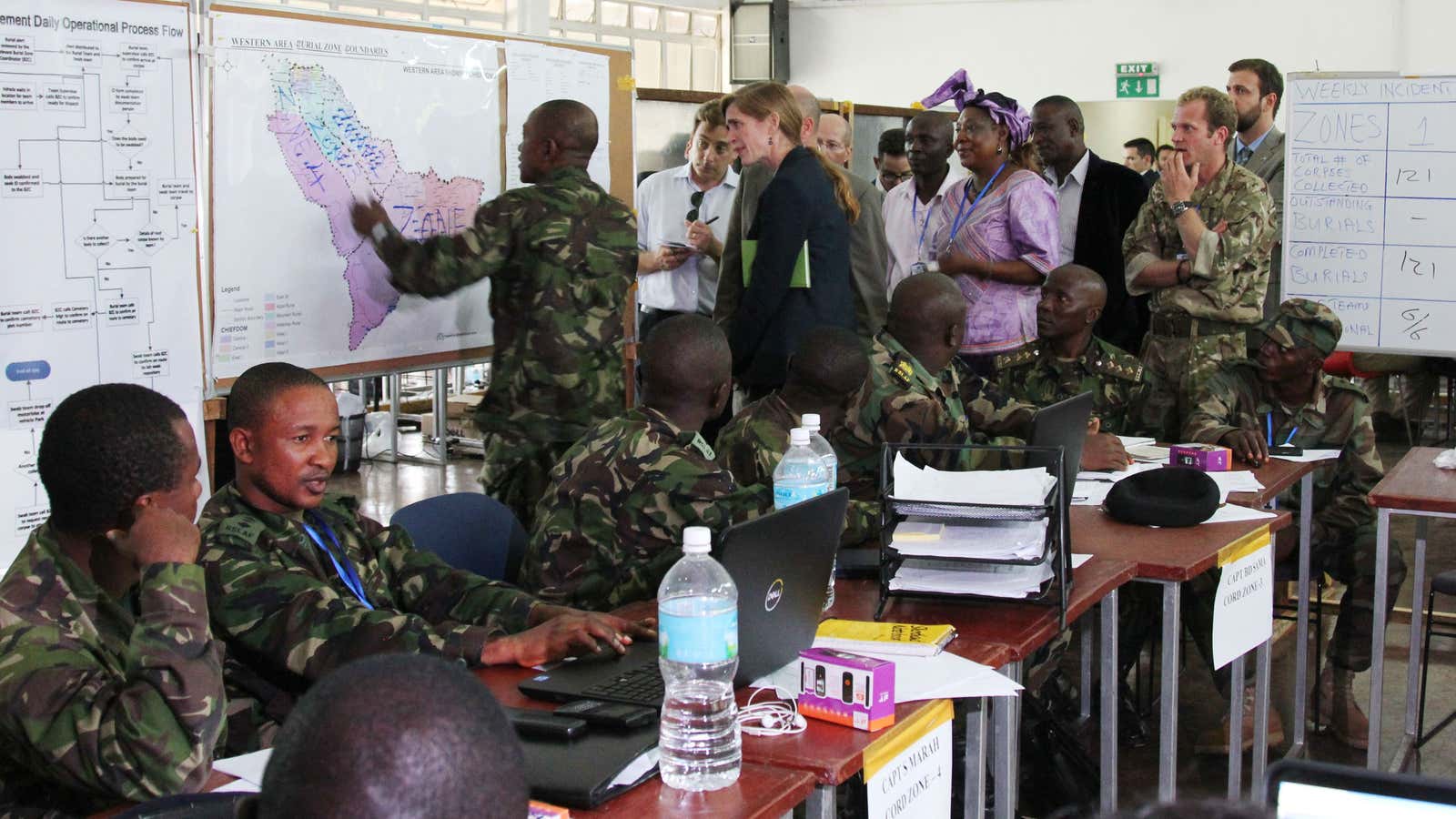Do you think the Center for Disease Control is not telling Americans the whole truth about Ebola? Maybe, like George Will, you believe the virus is airborne? How much do you know about Ebola’s origins as a weaponized biological agent patented by the US government and tested on unsuspecting patients at a research lab in Sierra Leone?
This summer, as the Ebola outbreak spread across Guinea, Sierra Leone and Liberia, much was written about how rampant conspiracy theories among West Africans were hampering the relief efforts and contributing to the spread of the disease.
Some simply denied Ebola’s existence, while others believed accounts of shadowy men, hired by mineral water companies, spiking wells with an Ebola-like poison. Why not, it was in the papers.
People tried strange cures and outlandish preventative measures like drinking gallons of saltwater—a meme that spread across West Africa via text message in the early morning hours one day in August and ended up killing two Nigerians.
Then, with the arrival of the disease on US soil and the public attention it drew, came a surge of Americanized conspiracies, spread, just like in West Africa, via social media and irreverent radio talk shows. It should have come as no surprise, Americans are the world champions in the sport of building elaborate paranoid theories about people in power.
The psychology of conspiracy
Dr. Michael Wood is a social psychologist at Winchester University in the UK who has done numerous studies on the thinking behind conspiracy theories, from lab tests to an analysis of online commentators. He admits to being swamped in Ebola conspiracy talk.
“Whenever there’s a pandemic of some kind you get a lot of the same stuff,” says Wood. He classifies the responses to illness and disease into a few major families:
1. Not believing in the virus
This is the case for all the people who believed early on, especially in Liberia, that Ebola was a hoax perpetrated by their national government to get more foreign aid dollars.
Related to this is the family of theories based on the “natural cure that they don’t want you to know about.” “They” being the government and the pharmaceutical industry; the “cure” usually a vitamin or an essential oil. Believers in this theory are the bane of the Food and Drug Administration which finds itself cracking down on online stores purporting to stock natural Ebola cures.
In August, Nigerian Health Minister Onyebuchi Chukwu was taken in by one of these natural cures, announcing that he would start treating Nigerian Ebola sufferers with a popular substance called nano-silver, before an international backlash convinced him not to.
2. Believing the virus is a bioweapon
This is the big one. The theory that claims the virus is in fact a biological weapon, sometimes described as having escaped from a lab, and sometimes sent purposefully to kill 90% of the earth’s population. This, according to Wood, is a theory that often gets proposed when new diseases emerge and the new one gets built around the bones of the old one.
English-language news networks funded by foreign governments antagonistic to the US have taken to spreading these theories as part of a global propaganda war: The Ebola-as-American-bioweapon theory has been a heated topic of discussion on the Iran-funded Press TV network, which is aired in many parts of the world, and produces popular online videos of its programming. Likewise, the Russia-funded network RT has made allegations that secret documents show the United States’ intent to build an Ebola bioweapon.
A bipartisan issue
Conspiracy theories exist both on the left and the right. Celebrated feminist author Naomi Wolf’s view that American troops sent to Liberia will result in Ebola’s arrival in the US—justifying military control over the US’ population—is essentially a leftist take on the popular right-wing talk-radio theory that the intervention is part of Obama’s plan to spread Ebola at home and turn America into a “third-world nation.”
Rather than dividing theories into left and right, it might be simpler to look at conspiracy theories as a kind of coherent ideology unto itself, a fundamental part of a person’s worldview.
“Probably the biggest indication of whether someone believes in an Ebola conspiracy theory, is whether they believe in other conspiracy theories,” says Wood.
For these people, conspiracy is a major driving force in world affairs. Seemingly random events for one person are seen by the conspiracy believer “as carefully orchestrated steps in a plot for global domination,” according to Wood, whose studies have shown that when a person believes in conspiracies she is often willing to believe in all of them, even when they contradict one other.
And so while Wood is careful to note that there hasn’t been a lot of cross-cultural research into the subject it’s probably safe to say that the conspiracy theory is ingrained somewhere in our human consciousness, as a way of dealing with disempowerment and hierarchy.
But who decides exactly when a healthy suspicion that government is doing the wrong thing crosses over to conspiracy theory? Where’s the line exactly? For all his work on the subject Wood doesn’t profess to know the answer.
Correction: A previous version of this post misspelled Naomi Wolf’s name.
